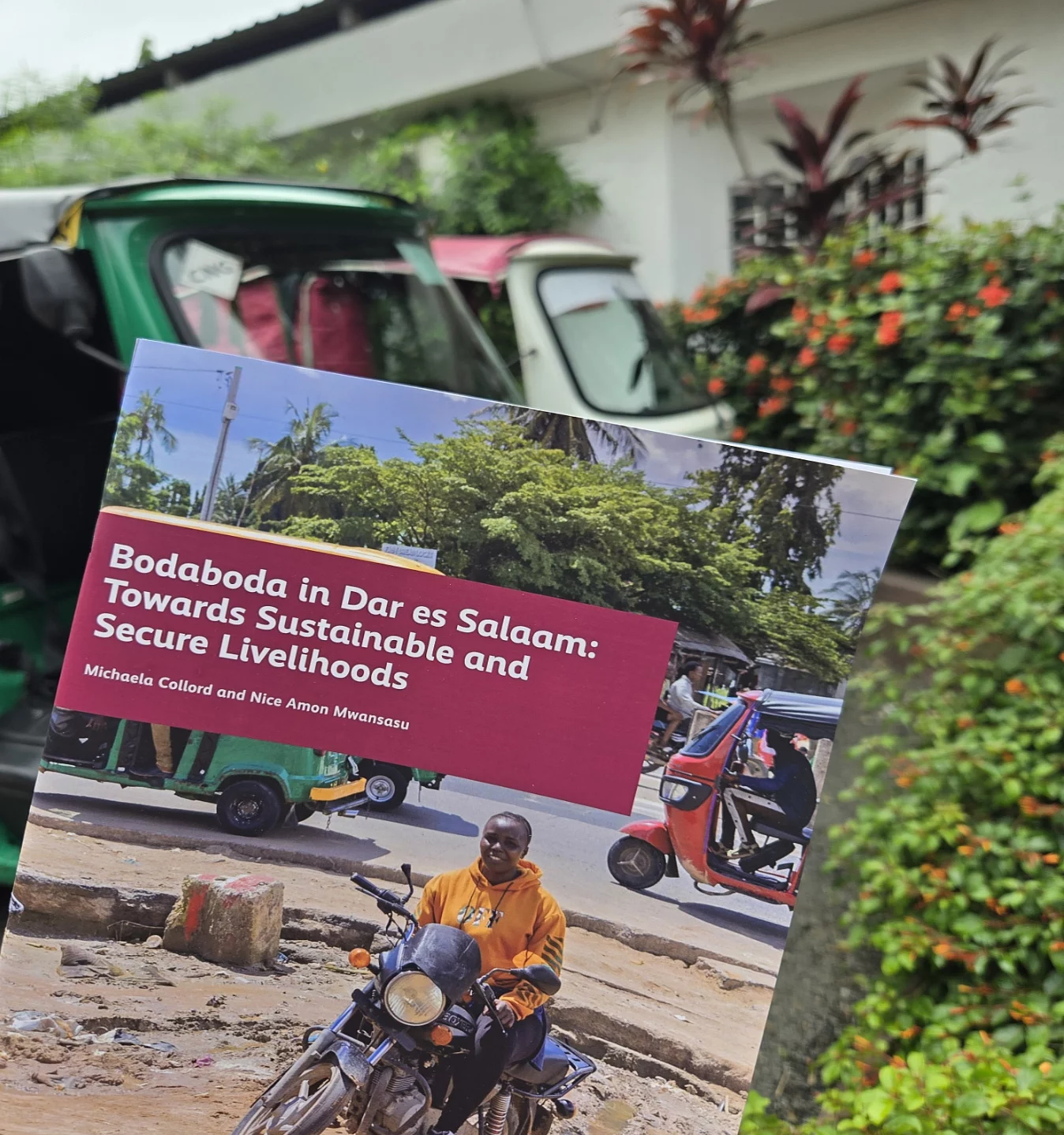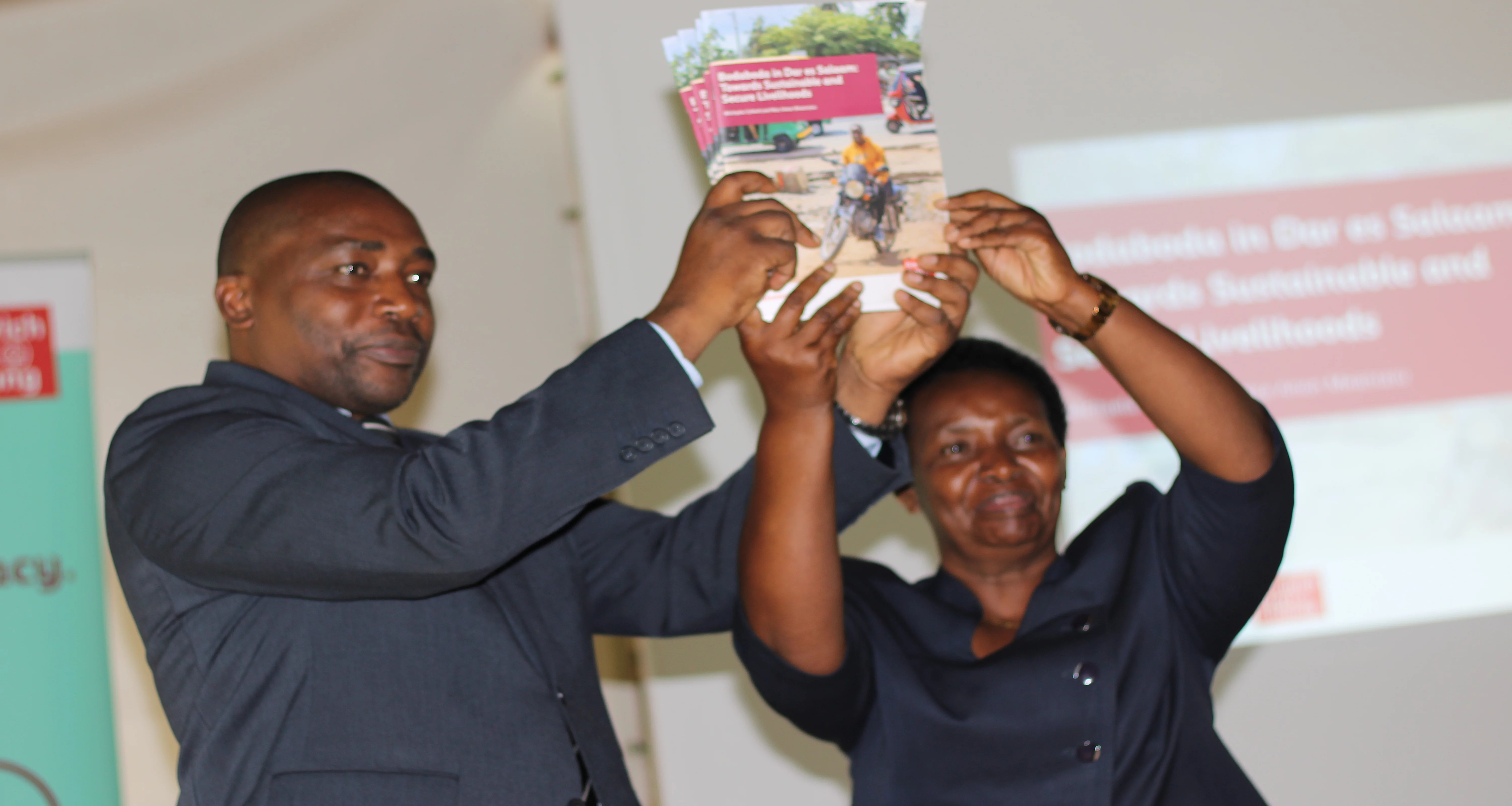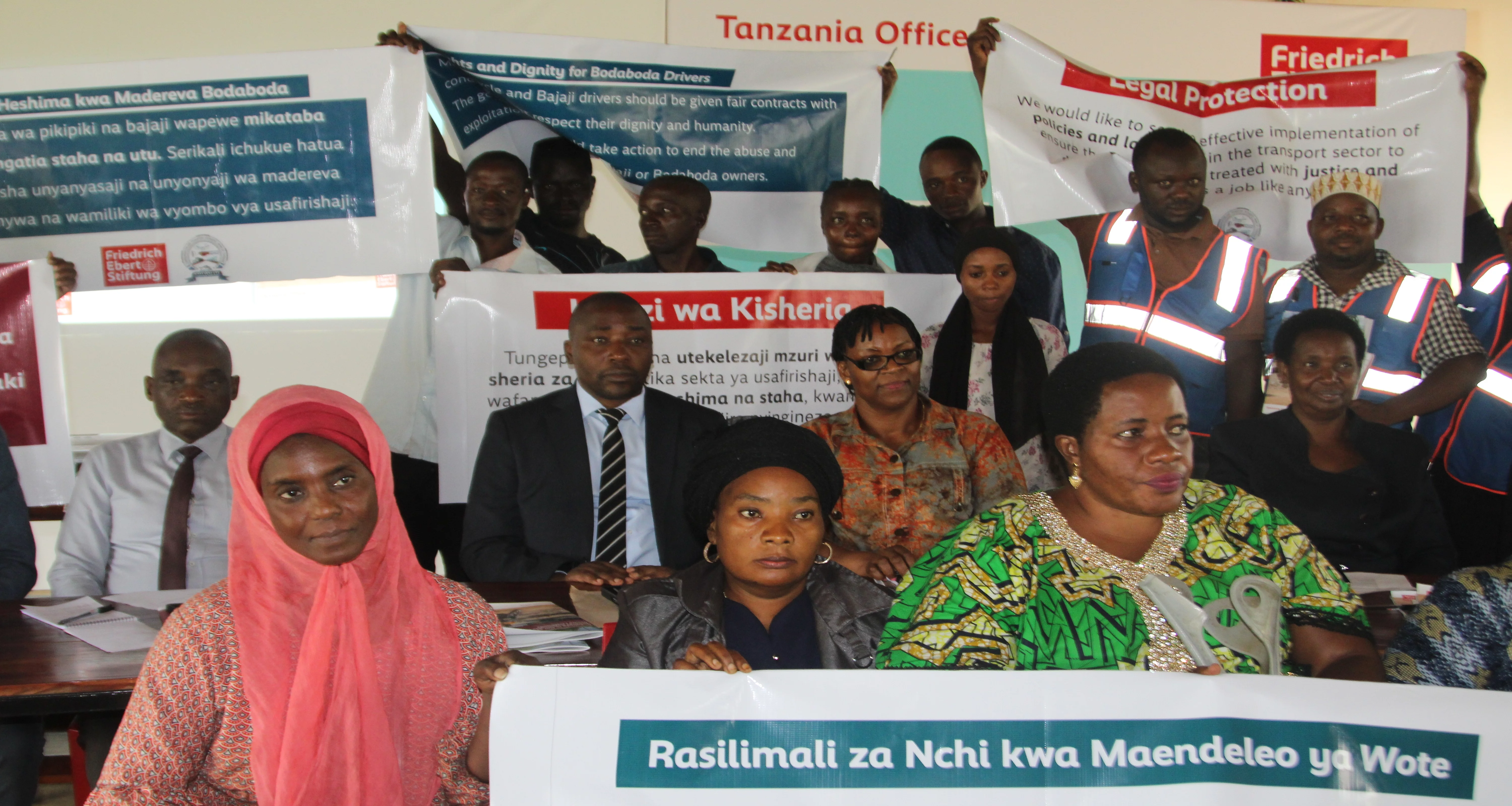- Publication
- Trade Unions
FES Tanzania and COTWU-T Launch Report on Bodaboda Sector: Addressing Gender-Based Violence and Promoting Sustainable Transport
The motorcycle-taxi (bodaboda) sector in Dar es Salaam is a vital lifeline for urban mobility and livelihoods, employing thousands of drivers, including a growing number of women. However, the sector faces significant challenges, including precarious work conditions, regulatory gaps, and pervasive gender-based violence (GBV). A report by the Friedrich-Ebert-Stiftung (FES) Tanzania and the Communication and Transport Workers Union of Tanzania (COTWU-T) highlights important issues, providing insights and recommendations to promote sustainable transport and equitable livelihoods. The report, authored by Michaela Collord, Assistant Professor at the School of Politics and International Relations, University of Nottingham and Nice Amon Mwasasu, an organizer at COTWU-T, and was launched on June 5, 2025, at the FES Tanzania Makuti Venue in Dar es Salaam.
The Scale of the Issue in the Transport Sector
The bodaboda sector, while a crucial source of income for many, is marked by structural challenges that undermine its sustainability and fairness. Drivers, who support an average of 4-5 dependents, face precarious working conditions, with limited opportunities for savings or investment beyond daily survival. Women drivers, in particular, encounter significant barriers, including marginalization and gender-based violence in public spaces. The report highlights that GBV is a pervasive issue, with women drivers reporting harassment and unsafe working environments, which not only affects their well-being but also discourages their participation in the sector.
The transport sector's challenges are compounded by unregulated private-sector players, such as asset-finance companies and ride-hailing apps. High-interest motorcycle loans contribute to financial stress and road safety risks, with drivers noting that "the source of many accidents [is] motorcycle loans." Additionally, 53% of male and 66% of female drivers express dissatisfaction with ride-hailing apps, with 78% believing these platforms suppress their incomes. These dynamics exacerbate economic precarity and highlight the urgent need for reform.
Addressing GBV and other structural issues in the bodaboda sector is critical for several reasons:
- Economic Equity: The sector supports thousands of livelihoods, particularly for low-income urban residents. Ensuring fair incomes and safe working conditions is essential for reducing poverty and promoting economic stability.
- Gender Inclusion: Women’s participation in transport is growing, but GBV and lack of support hinder progress. Empowering women drivers can normalize their presence in the sector and drive broader gender equality.
- Urban Sustainability: Unregulated growth of moto-taxis contributes to congestion and safety risks. Sustainable transport solutions require inclusive, well-coordinated policies that prioritize drivers’ welfare.
Speaking at the launch of the report, COTWU Tanzania Secretary General Ms. Juliana Mpanduji stated she felt comforted that the launch was taking place during the 113th International Labour Organization (ILO) conference in Switzerland. This conference is discussing various worker issues, including decent work in the platform economy and innovative approaches to promoting transitions from the informal to the formal economy. She believes these international efforts will be adopted by the relevant ministry in Tanzania to ensure motorcycle taxi (bodaboda) workers enjoy their rights like other formal sector employees.
Key Findings of the Report
Drawing on qualitative interviews, a survey of 150 drivers (including 47 women), and extensive literature reviews, the report provides a comprehensive analysis of Dar es Salaam’s bodaboda sector:
- Livelihoods: 68% of male and 78% of female drivers report improved incomes since joining the sector, underscoring its importance as a livelihood source. However, precarious conditions limit long-term financial security.
- Regulatory Challenges: Since formal regulations began in 2010, reforms have been episodic and often overly ambitious, lacking context-specific adaptation. Recent efforts under President Samia’s administration (2021–) show promise but are hindered by fragmented governance and top-down approaches.
- Private Sector Impact: Asset-finance companies and ride-hailing platforms, such as Uber and Bolt, often depress incomes and worsen congestion. Regulatory gaps allow these companies to operate with minimal oversight, to the detriment of drivers.
Recommendations for a Sustainable and Equitable Bodaboda Sector
The report proposes six key recommendations to address these challenges, with a strong emphasis on tackling GBV and promoting sustainability:
- Improved Institutional Coordination
Enhance inter-ministerial and citywide coordination to streamline moto-taxi regulation. National authorities like LATRA, TANROADS, and TARURA should collaborate with local governments, leveraging initiatives like the Dar es Salaam Road Safety Committee to ensure cohesive planning. - Incremental and Participatory Formalization
Shift from top-down, comprehensive reforms to incremental, participatory approaches that align national regulations with local practices. This includes adopting best practices from local government authorities (LGAs) for realistic standards, such as parking area planning. - Localized Organizing
Move away from large, district-level drivers’ associations, which often lack accountability, and support ward- and street-level self-regulating groups. These informal co-operatives, often based around parking areas, could be strengthened through Tanzania’s co-operative development frameworks. - Stricter Regulation of Private Sector Stakeholders
Introduce regulations to curb high-interest loans from asset-finance companies and ensure ride-hailing platforms provide living wages, social protections, and ethical data practices. Policymakers should also address the misclassification of drivers as independent contractors to grant them legal protections. - Support for Women Drivers
Prioritize women’s inclusion through subsidized training programs for commercial driver’s licenses, low/no-interest motorcycle loans, and tailored policies to combat GBV. The report suggests adopting strategies similar to the Ministry of Community Development’s GBV Guidelines for Public Spaces and encourages partnerships with bus and logistics companies to hire more women. Women drivers expressed aspirations, with one noting, “Being a driver was my dream. One day I will drive a truck.” - Inclusive Infrastructure Planning
Involve drivers in urban infrastructure projects, such as creating shelters, dedicated lanes, and long-term plans to avoid repeated displacement. This ensures infrastructure supports both drivers’ needs and sustainable urban mobility.
Event Details
The report was launched on June 5, 2025, at the FES Tanzania Makuti Venue, Dar es Salaam. The event brought together government representatives, trade unions, bodaboda drivers, media, and civil society for a critical dialogue on sustainable transport and secure livelihoods.
The bodaboda sector is more than a mode of transport—it’s a cornerstone of urban livelihoods and mobility in Dar es Salaam. Addressing GBV and structural challenges is essential to creating a sector that is safe, equitable, and sustainable. By implementing these recommendations, policymakers can empower drivers, particularly women, and build a transport system that serves all residents.


